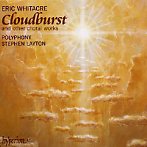You hear about huge advance orders for the latest CD by the biggest, hottest pop superstar, or for the most fashionably hip tell-all book–but when the buzz is about a CD of classical choral music? Yes, there have been big successes by vocal groups during the last decade or two–Anonymous 4, the King’s Singers, the Choir of King’s College, Cambridge, the Tallis Scholars, the Bulgarian women’s choirs, and don’t forget those Spanish monks–and by choral composers, including the abundantly popular John Rutter, the eminently revered Arvo Pärt, and the currently faddish and always challenging texturalist Morten Lauridsen. Even the sparsely talented John Tavener managed to make a mark, and his contined output of pretentious and opportunistic creations shows just how wide and open-armed the choral music world can be.
And then there’s Eric Whitacre, a 35-year-old American composer who in a few short years has carved more than just a niche: his music has captured the hearts and minds of singers, conductors, and vocal music fans across oceans and continents. According to his press materials, his piece Water Night “has become one of the most popular choral works of the last decade…one of the top selling choral publications in the last five years”, and his published works “have sold more than 350,000 copies worldwide.” On hearing the 14 selections on this CD–and after a memorable encounter with his new work A Boy and a Girl (premiered on this disc) at a national choral convention last year–I can only say that the acclaim and attention is well deserved.
You could say that Whitacre is the “anti-Tavener”; in other words, he’s fiercely, organically original. His use of harmony and unusually knowing way with choral “effects” comes from an internal hearing and unique imagining, not from what he thinks may be the “next cool thing”. Neither do his works carry anything close to the immediate accessibility of Rutter’s melody-driven community and church choir favorites, nor are they reminiscent of the time-altering, “mystical” intonations of Pärt or the close-harmony, inverted-chord style of Lauridsen–although elements of all three are present to some degree.
Whitacre, a consummately thoughtful composer, is an original voice, his compositions firmly rooted in and arising from the texts–and it’s this respect for the words and their meaning that leads him to choose his texts well, favoring the quirky but powerful creations of E.E. Cummings, the bold simplicity of Emily Dickinson, and the vividly imagistic, penetratingly romantic expressions of Lorca and Paz. And he’s not only interested in the words, but in the musical colors and textures they suggest relative to vocal sound.
Whitacre has a thing he does with shifting chords, sudden and strangely startling harmonic alterings that seem to involve only very subtle changes of pitch–but nevertheless kind of throw you, but not in an unpleasant way. He does this in different ways and contexts in many of his pieces (I hide myself; Lux aurumque; the final minute of Sleep; throughout A Boy and a Girl)–and the effect, while hard to describe, is kind of like that gut-tingling sensation caused by a sudden downhill swoop when driving over a back road. Who doesn’t want to go back and do it again? Well, you’ll want to experience these harmonic “tingles” over and over, not because they’re gimmicks, but because they are so poignant and so perfectly illuminate the poetry.
Whitacre constantly seems to be experimenting with and expanding the functional possibilities of chords, preparing us for one thing and then offering another, yet more elegant and satisfying solution, extending a phrase with some sort of thick-textured, bass-heavy dissonance, or suddenly breaking up the flow with alternating rests and short melodic/harmonic utterances. And Whitacre is quite the dramatist, knowing just how to develop a work musically to bring us to a satisfying conclusion every time. It can be quiet and soul-warming–or, as in the ending of Her sacred spirit soars, as heart-stoppingly electrifying as anything you’ve ever heard in an a cappella choral work.
There are so many gorgeous and deeply moving moments among these works, my favorites being Go, lovely Rose, Lux aurumque, and the scintillating masterpiece A Boy and a Girl. I’m not that fond of the too-long-for-its-material When David heard, and some of the very interesting and ingenious percussive effects in Cloudburst don’t come off so well on a recording–but this is the work of a significant composer whose artistic talent is genuine and whose success so far has come entirely from the quality, originality, and sincerely-won appeal of his music. No weird artificial persona, no mystical religious conversions, no irrelevant extra-musical indulgences. How refreshing! And he’s fortunate to have such committed, adventurous, world-class musical advocates as Stephen Layton and Polyphony–not to mention the folks at Hyperion–to present his music so convincingly. Simon Eadon’s engineering, from London’s Temple Church, is top-notch, and Meurig Bowen’s very readable, informative notes complete a package that ranks as one of the truly worthwhile recording events of 2006. [2/10/2006]
































